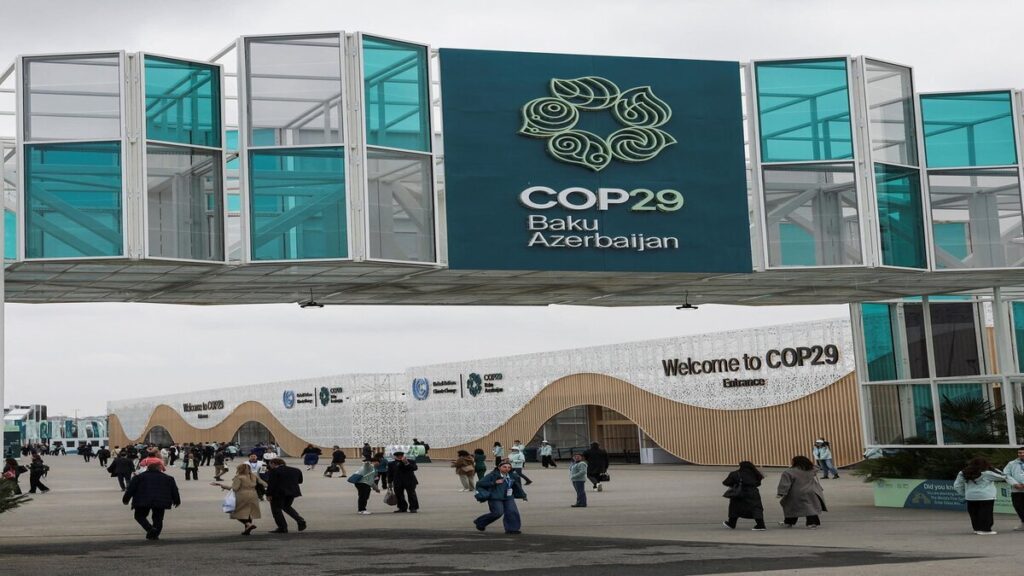As the 29th Conference of the Parties (COP29) unfolds in Baku, Azerbaijan, the urgency for climate action is palpable. Delegates from nearly 200 countries have gathered to address one of the most pressing issues of our time: climate finance. The conference, which began on November 11, 2024, has already highlighted the stark divide between developed and developing nations regarding financial commitments essential for combating climate change.

World meets to negotiate climate finance:photo courtesy
The backdrop of COP29 is marked by a year of unprecedented climate events, reinforcing the need for robust financial support for developing nations. The current target of $100 billion per year, established during previous COP meetings, is under scrutiny as developing countries demand an increase to $1.3 trillion annually by 2035. Simon Stiell, the UN climate chief, emphasized that without significant financial aid, many nations will struggle to meet their emission reduction targets, potentially jeopardizing global efforts to limit temperature rises to below 1.5°C.
Environmental activists protest during the United Nations climate change conference COP29, in Baku, Azerbaijan on November 15, 2024:photo courtesy
Azerbaijan’s President Ilham Aliyev opened the conference with a call for unity and cooperation among nations. He acknowledged the challenges posed by climate change, stating that “time is too precious to be wasted on blame over global warming or environmental harm.” This sentiment resonates deeply among developing nations, which are increasingly vocal about their needs for financial assistance and technology transfer.
Despite high hopes at the outset of COP29, progress on financing discussions has been slow. As of mid-conference, negotiators were still grappling with a new climate finance goal amidst a complex web of interests and priorities. The initial nine-page draft text presented by negotiators ballooned to 34 pages as discussions evolved, reflecting the contentious nature of these negotiations. Economists have called for advanced economies to triple their contributions to climate finance, underscoring the need for a more equitable distribution of responsibilities in addressing climate change.
The absence of key leaders has further complicated matters. Notably, outgoing U.S. President Joe Biden and German Chancellor Olaf Scholz were missing from early discussions, raising concerns about the commitment levels from major economies. The specter of Donald Trump’s potential return to power looms large over negotiations; his previous withdrawal from the Paris Agreement casts doubt on U.S. participation in future climate commitments.
Developing nations have taken center stage at COP29, advocating fiercely for their interests. Adonia Ayebare, representing over 100 developing countries and China, remarked that financial negotiations reveal true intentions and stressed that developed nations must not shy away from their commitments. The push for increased funding is not merely about charity; it is about ensuring equitable development and resilience against climate impacts.
A significant point of contention lies in the proposal to expand the contributor base for climate finance to include emerging economies like China and Gulf states. Developing countries argue that this could dilute responsibility and undermine existing commitments from wealthier nations.
As COP29 progresses into its second week, expectations are high for government ministers who are set to arrive with mandates aimed at reaching compromises on critical issues. The conference presents a unique opportunity to redefine global climate finance structures and enhance collaboration among nations.
The establishment of international carbon market standards has been one positive development during COP29. These standards are expected to facilitate resource allocation towards developing countries while also addressing loss and damage caused by climate impacts. However, much work remains to ensure that these initiatives translate into tangible benefits for those most affected by climate change.
COP29 stands at a critical juncture where decisions made could shape the future trajectory of global climate action. The call for increased financial support from developed nations is not just a plea; it is an urgent demand rooted in the realities faced by vulnerable communities worldwide. As delegates work towards consensus amid challenges and distractions, the world watches closely.
The success of COP29 hinges on collective action and commitment from all nations involved. As Simon Stiell aptly stated, “global cooperation is the only way humanity survives global warming.” The coming days will be pivotal in determining whether this cooperation can translate into effective solutions that prioritize both ambition and equity in our fight against climate change.